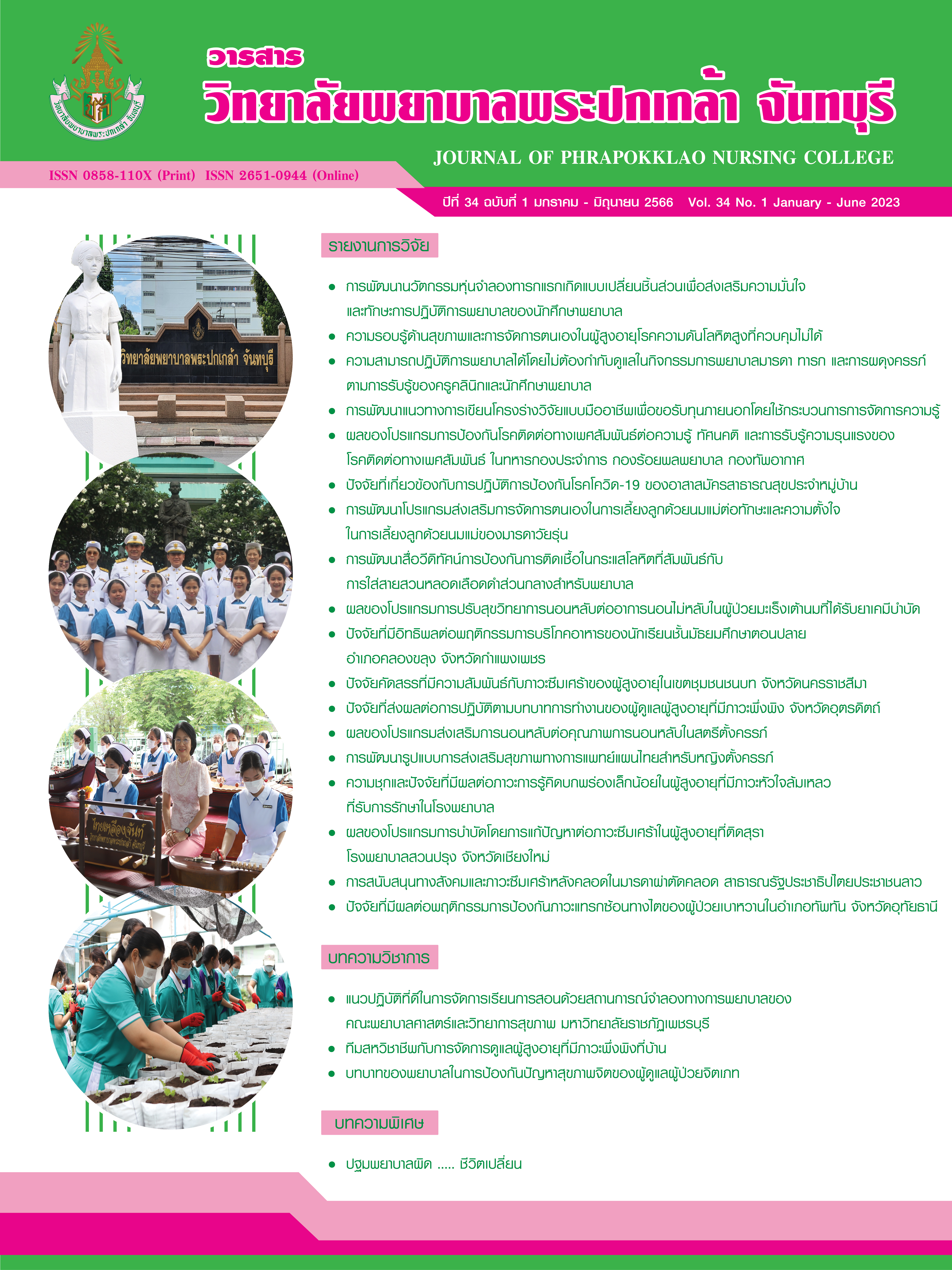Development of a Thai Traditional Medicine Health Promotion Model for Pregnant Women
Keywords:
Thai Traditional Medicine, Health promotion, Pregnant womenAbstract
This research and development aimed to develop and evaluate the results of the Thai Traditional Medicine health promotion model for pregnant women. There were three phases of research, including: 1) situation analysis; 2) operation phase; and 3) evaluation phase. The samples for model evaluation consisted of 50 pregnant women who came for antenatal care at Saraphi Hospital, Chiang Mai Province and were equally divided into an experimental group (n = 25) and a control group (n = 25). The research instruments included the group discussion questions, the interview questions for pregnant women, the handbook of Thai Traditional Medicine health promotion, the exercise video clip, the Thai Traditional Medicine health promotion model for pregnant women, the general information questionnaire, the Thai Traditional Medicine health promotion knowledge test with reliability of .87, and the possibility questionnaire with reliability of .89. The implementation and data collection were conducted from May to August, 2020. Data were analyzed using frequency, percentage, mean, standard deviation, Chi-square test, Fisher’s exact test, paired t-test, independent t-test, and summation method.
The research results revealed that 1) the Thai Traditional Medicine health promotion model consisted of three topics: herbals, Lue-Sri-Dat-Ton exercise, and breast care; 2) after receiving the model, the experimental group had statistically significantly higher mean score of Thai Traditional Medicine health promotion knowledge than that of before receiving the model (t = 9.212, p < .001); 3) the experimental group had statistically significantly higher change score of Thai Traditional Medicine health promotion knowledge than that of the control group (t = 5.495, p < .001); and 4) the possibility of the model was at a high level.
This research suggests that antenatal health personnel should apply this Thai Traditional Medicine health promotion model to pregnant women to provide knowledge. This will help pregnant women obtain more knowledge and alternative health care.
References
กมลทิพย์ ตั้งหลักมั่นคง, เพชรา ทองเผ้า, จิตตานันท์ ศรีสุวรรณ, และอรพนิต ภูวงษ์ไกร. (2559). การศึกษาภูมิปัญญาท้องถิ่นในการดูแลมารดาและทารกโดยใช้ห้องเรียนชุมชน และการเรียนรู้โดยใช้วิจัยเป็นฐาน. วารสารศูนย์การศึกษาแพทยศาสตร์คลินิก โรงพยาบาลพระปกเกล้า, 33(4), 288–299.
กรุณา ประมูลสินทรัพย์, กมลทิพย์ ขลังธรรมเนียม, จริยาวัตร คมพยัคฆ์, และเอกชัย โควาวิสารัช. (2556). ผลของโปรแกรมส่งเสริมสุขภาพต่อพฤติกรรมส่งเสริมสุขภาพของหญิงตั้งครรภ์วัยรุ่นครรภ์แรก. วารสารสมาคมพยาบาลฯ สาขาภาคตะวันออกเฉียงเหนือ, 31(4), 54–60.
เตือนใจ ซุ่นฮะ, และกนกศรี จาดเงิน. (2558). ประสิทธิภาพคู่มือการให้ความรู้ สำหรับหญิงตั้งครรภ์วัยรุ่น. วารสารมหาวิทยาลัยนราธิวาสราชนครินทร์, 7(1), 36–45.
ธีรยา นิยมศิลป์, และณัฏฐิญา ค้าผล. (2553). การให้บริการด้านการแพทย์แผนไทยในโรงพยาบาลสังกัดกระทรวงสาธารณสุข. วารสารไทยไภษัชยนิพนธ์, 5, 178–189.
บุญเติม ปิงวงค์, และเทพประวิณ จันทร์แรง. (2559). การบูรณาการการแพทย์แผนไทยกับการดูแลสุขภาพตามแนวทางพระพุทธศาสนา: กรณีศึกษาวัดส่งเสริมสุขภาพชุมชนในเขตภาคเหนือ. วารสารบัณฑิตวิจัย, 7(2), 195–206.
ปิยะนันท์ ลิมเรืองรอง. (2560). การพยาบาลสตรีระยะตั้งครรภ์. กรุงเทพฯ: โครงการตำราคณะพยาบาลศาสตร์ มหาวิทยาลัยมหิดล.
เยาวเรศ สมทรัพย์. (2553). ศาสตร์ทางเลือกในการพยาบาลสตรีตั้งครรภ์. สงขลา: บี เอส เอส ดิจิตอลออฟเซ็ท.
ศศิธร โพธิ์ชัย, พวงผกา คงวัฒนานนท์, และวนลดา ทองใบ. (2561). ความเชื่อตามวัฒนธรรมเกี่ยวกับการตั้งครรภ์ และพฤติกรรมการดูแลสุขภาพของหญิงตั้งครรภ์แรงงานข้ามชาติชาวกัมพูชา. วารสารคณะพยาบาลศาสตร์ มหาวิทยาลัยบูรพา, 26(3), 71–81.
สำนักส่งเสริมสุขภาพ กรมอนามัย. (2565). คู่มือการฝากครรภ์สำหรับบุคลากรสาธารณสุข. นนทบุรี: ผู้แต่ง.
สุภาวดี เงินยิ่ง, พิริยา ศุภศรี, และวรรณทนา ศุภสีมานนท์. (2556). ผลของโปรแกรมส่งเสริมสุขภาพต่อพฤติกรรมสุขภาพด้านโภชนาการและการจัดการความเครียดในหญิงตั้งครรภ์วัยรุ่น. วารสารคณะพยาบาลศาสตร์ มหาวิทยาลัยบูรพา, 21(4), 37–48.
สุรีพร ศรโพธิ์อุ่น, และปราณี ธีรโสภณ. (2558). การพัฒนาโปรแกรมการส่งเสริมสุขภาพในการป้องกันอาการปวดหลังส่วนล่างในหญิงตั้งครรภ์. วารสารการพยาบาลและการศึกษา, 8(3), 81–92.
อารมย์ โคกแก้ว, พัทธวรรณ ชูเลิศ, และมนัสชนกฑ์ กุลพานิชย์. (2565). ผลของการใช้โปรแกรมส่งเสริมสุขภาพต่อความรู้และพฤติกรรมการดูแลตนเองของหญิงตั้งครรภ์วัยรุ่น. วารสารมหาจุฬานาครทรรศน์, 9(8), 17–31.
เอ็มวิกา แสงชาติ, และรุจิรา ดวงสงค์. (2559). ผลของโปรแกรมสุขศึกษาร่วมกับการใช้สื่ออิเล็กทรอนิกส์ (Facebook) ในการป้องกันการตั้งครรภ์ในวัยรุ่น สำหรับนักเรียนหญิงระดับชั้นมัธยมศึกษาปีที่ 1. วารสารสํานักงานป้องกันควบคุมโรคที่ 7 จังหวัดขอนแก่น, 23(1), 96–104.
Pender, N. J. (1996). Health promotion in nursing practice (3rd ed.). Stamford, CT: Appleton & Lange.
Say, L., Chou, D., Gemmill, A., Tunçalp, Ö., Moller, A. B., Daniels, J., … Alkema L. (2014). Global causes of maternal death: A WHO systematic analysis. The Lancet, Global Health, 2(6), 323–333. doi:10.1016/S2214-109X(14)70227-X
World Health Organization. (2019). Maternal mortality. Retrieved from https://www.who.int/news-room/fact-sheets/detail/maternal-mortality
Downloads
Published
How to Cite
Issue
Section
Categories
License
Copyright (c) 2023 JOURNAL OF PHRAPOKKLAO NURSING COLLEGE

This work is licensed under a Creative Commons Attribution-NonCommercial-NoDerivatives 4.0 International License.
เนื้อความ ข้อมูล และรายการอ้างอิงที่ผู้เขียนใช้ในการเขียนบทความเพื่อลงตีพิมพ์ในวารสารวิทยาลัยพยาบาลพระปกเกล้า จันทบุรี ถือเป็นความคิดเห็นและความรับผิดชอบของผู้เขียน คณะผู้จัดทำวารสารไม่จำเป็นต้องเห็นพ้องด้วยหรือร่วมรับผิดชอบ
บทความที่ได้รับการลงตีพิมพ์ในวารสารวิทยาลัยพยาบาลพระปกเกล้า จันทบุรี ถือเป็นลิขสิทธิ์ของวารสารวิทยาลัยพยาบาลพระปกเกล้า จันทบุรี หากหน่วยงานหรือบุคคลใดต้องการนำส่วนหนึ่งหรือทั้งหมดของบทความไปเผยแพร่ต่อเพื่อวัตถุประสงค์ใด ๆ จะต้องได้รับอนุญาตจากบรรณาธิการวารสารก่อน



